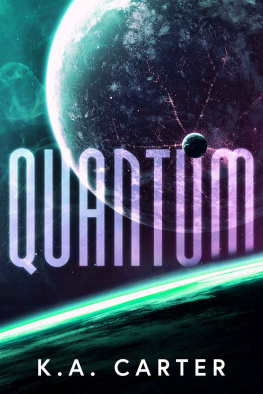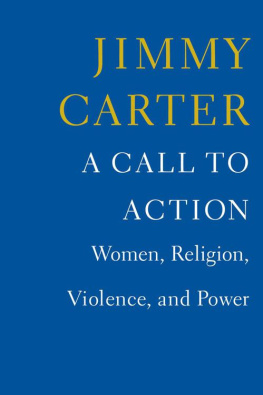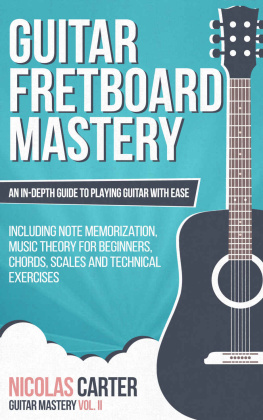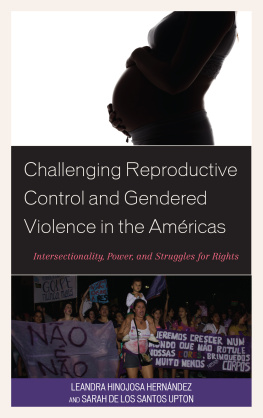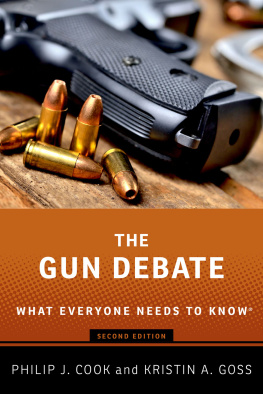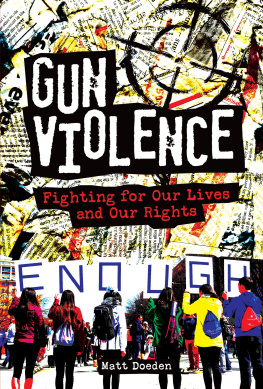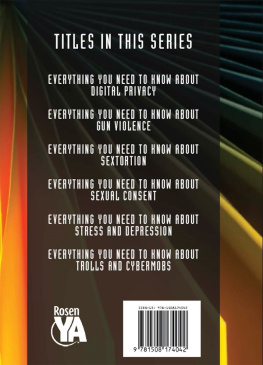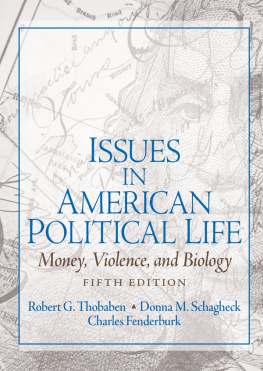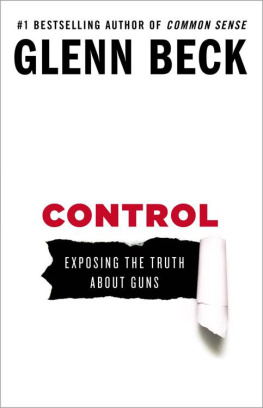Gun Control in the United States
Recent Titles in the
CONTEMPORARY WORLD ISSUES
Series
Illegal Immigration: A Reference Handbook, second edition
Michael C. LeMay
Obesity: A Reference Handbook, second edition
Judith S. Stern and Alexandra Kazaks
Solar Energy: A Reference Handbook
David E. Newton
Prescription Drug Abuse: A Reference Handbook
David E. Newton
The Minimum Wage: A Reference Handbook
Oren M. Levin-Waldman
Juvenile Justice: A Reference Handbook, second edition
Donald J. Shoemaker and Timothy W. Wolfe
The Global Water Crisis: A Reference Handbook
David E. Newton
Youth Substance Abuse: A Reference Handbook
David E. Newton
Global Pandemic Threats: A Reference Handbook
Michael C. LeMay
Same-Sex Marriage: A Reference Handbook, second edition
David E. Newton
DNA Technology: A Reference Handbook, second edition
David E. Newton
Modern Sport Ethics: A Reference Handbook, second edition
Angela Lumpkin
Marijuana: A Reference Handbook, second edition
David E. Newton
Books in the Contemporary World Issues series address vital issues in todays society such as genetic engineering, pollution, and biodiversity. Written by professional writers, scholars, and nonacademic experts, these books are authoritative, clearly written, up-to-date, and objective. They provide a good starting point for research by high school and college students, scholars, and general readers as well as by legislators, businesspeople, activists, and others.
Each book, carefully organized and easy to use, contains an overview of the subject, a detailed chronology, biographical sketches, facts and data and/or documents and other primary source material, a forum of authoritative perspective essays, annotated lists of print and nonprint resources, and an index.
Readers of books in the Contemporary World Issues series will find the information they need in order to have a better understanding of the social, political, environmental, and economic issues facing the world today.
CONTEMPORARY WORLD ISSUES
Gun Control in the United States
A Reference Handbook
Second Edition
Gregg Lee Carter
Copyright 2017 by ABC-CLIO, LLC
All rights reserved. No part of this publication may be reproduced, stored in a retrieval system, or transmitted, in any form or by any means, electronic, mechanical, photocopying, recording, or otherwise, except for the inclusion of brief quotations in a review, without prior permission in writing from the publisher.
Library of Congress Cataloging-in-Publication Data
Names: Carter, Gregg Lee, 1951 - author.
Title: Gun control in the United States : a reference handbook / Gregg Lee Carter.
Description: Second edition. | Santa Barbara, California : ABC-CLIO, [2017] | Series: Contemporary world issues | Includes bibliographical references and index.
Identifiers: LCCN 2016042008 (print) | LCCN 2016056897 (ebook) | ISBN 9781440835667 (alk. paper) | ISBN 9781440835674 (ebook)
Subjects: LCSH: Gun controlUnited States. | FirearmsLaw and legislationUnited States. | FirearmsSocial aspectsUnited States. | Violent crimesUnited States.
Classification: LCC HV7436 .C36 2017 (print) | LCC HV7436 (ebook) | DDC 363.330973dc23
LC record available at https://lccn.loc.gov/2016042008
ISBN: 978-1-4408-3566-7
EISBN: 978-1-4408-3567-4
21 20 19 18 17 1 2 3 4 5
This book is also available as an eBook.
ABC-CLIO
An Imprint of ABC-CLIO, LLC
ABC-CLIO, LLC
130 Cremona Drive, P.O. Box 1911
Santa Barbara, California 93116-1911
www.abc-clio.com
This book is printed on acid-free paper 
Manufactured in the United States of America
Portions of this book have been updated from various entries in Guns in American Society: An Encyclopedia of History, Politics, Culture, and the Law (Santa Barbara, CA: ABC-CLIO, 2002; 2002 by Gregg Lee Carter), as well as from the Second Edition of this work (Santa Barbara, CA: ABC-CLIO, 2012, 2012 by ABC-CLIO, LLC); used by permission from the publisher.
Contents
| : Robert J. Spitzer |
| : Lawrence Southwick |
| : David B. Kopel |
The second edition of Gun Control in the United States: A Reference Handbook is the result of two decades of my thinking and writing on the controversial topic of gun control. My goal is to provide a well-organized and readable reference that makes this complex subject more accessible to a variety of audiences: researchers, teachers, students, public officials, law-enforcement personnel, journalists, and interested members of the general public. To enhance accessibility, I have broken down gun control in the United States along its key dimensions: its current and proposed regulations, its effectiveness, its chronology, its similarities and differences to gun control in other industrialized democracies, important legislation and court rulings, individuals who have had a notable impact on it through political action or academic research, prominent organizations and agencies involved on both sides of the gun control debate, and those print and electronic resources that use valid data and skilled analysis to pursue each of these areas in more depth.
I propose no easy solutions to the problem of gun violence, and I take seriously the arguments and data supporting both sides of the gun debate. This is unusual. The vast literature on guns control is biasedstrongly so. Popular writers and academics alike generally begin their books and essays with either a pro- or anti-gun slant and then proceed to line up the evidence to correspond with itignoring or discounting or misinterpreting any studies that do not fit. In contrast, I try to present enough information and logical reasoning, based on the best scholarly research to date, for each reader to make up his or her own mind on the benefits or harms that the strict control of guns might incur, as well as the obstacles facing those who would like to strengthen or weaken the current level of control. Everyone agrees that some control is necessary; the debate is over how much and what kind. All of this said, I must admit that over the years I have come to change my outlook from a fairly strong gun rights to a fairly strong gun control inclination. At heart, I am an empiricist, and though the logical reasoning of both sides of the gun debate have their strengths and moments of shining glory, in the end I find the scientific data to favor gun control. These data and their interpretations are complex, but I have struggled with them long enough to realize that comprehensive gun control can both reduce the economic costs and human suffering involved in the enormous amount of gun violence that the United States presently endures on a daily basis, while still protecting the right of individuals to own and use guns for lawful purposes, including hunting, target shooting, and self-defense.
I am grateful to the following scholars for the assistance noted: Stephen P. Halbrook, for clarification of federal gun control laws relating to domestic violence; David Hemenway (Harvard University), for sharing some of the unpublished data that was amassed in early the 2000s by the National Violent Injury Statistics System Workgroup; Harry L. Wilson (Roanoke College) for his communications with me on how the mass media portrays the gun debate; Glenn L. Pierce (Northeastern University) for his thoughtful conversations with me on ways to curb illegal gun trafficking, which is high on the agenda of gun control advocates; Robert J. Spitzer (State University of New York, Cortland), for his review of the topics covered in the Handbook to make sure that they fairly represent the range and complexity of the gun control issue; and Garen J. (Perspectives): David B. Kopel (Independence Institute; Denver University), Lawrence Southwick ( emeritus , University of Buffalo), and Robert J. Spitzer (State University of New York, Cortland). Professors Kopel, Spitzer, and Wilson have also been generous in sharing their opinions with me over the years on selected key topics that surround the gun debate, as has Professor James P. Beckman of the University of Central Florida. Those familiar with the relevant literature will recognize all of the above named individuals as high-profile analysts and commentators on the current debate over gun control in the United States.


